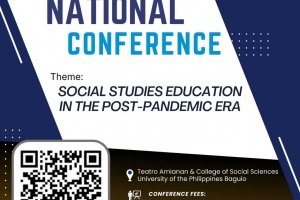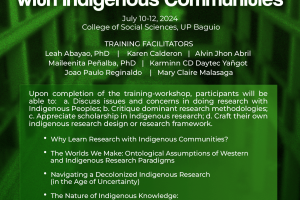Alex Taek-Gwang Lee in UP Baguio
10 August 2023 – Alex Taek-Gwang Lee in UP Baguio
The College of Social Sciences Lecture Series Committee, in partnership with the Department of History and Philosophy, and the UPB Philosophy Circle
presents
𝗔𝗟𝗘𝗫 𝗧𝗔𝗘𝗞-𝗚𝗪𝗔𝗡𝗚 𝗟𝗘𝗘 𝗜𝗡 𝗨𝗣 𝗕𝗔𝗚𝗨𝗜𝗢
𝟮𝟵 𝘁𝗼 𝟯𝟬 𝗔𝘂𝗴𝘂𝘀𝘁 𝟮𝟬𝟮𝟯
𝗖𝗼𝗹𝗹𝗲𝗴𝗲 𝗼𝗳 𝗦𝗼𝗰𝗶𝗮𝗹 𝗦𝗰𝗶𝗲𝗻𝗰𝗲𝘀
Dr. Alex Taek-Gwang Lee is a professor of cultural studies at Kyung Hee University in South Korea and visiting professor at the University of Brighton. He is a member of the advisory board for The International Deleuze and Guattari Studies in Asia and the board member of The International Consortium of Critical Theory Programs (ICCTP).
𝗦𝗰𝗵𝗲𝗱𝘂𝗹𝗲 𝗼𝗳 𝗘𝘃𝗲𝗻𝘁𝘀
29 𝘼𝙐𝙂 | “𝙎𝙥𝙞𝙣𝙤𝙯𝙖 𝙞𝙣 𝙩𝙝𝙚 𝙀𝙮𝙚𝙨 𝙤𝙛 𝘿𝙚𝙡𝙚𝙪𝙯𝙚”: 𝙍𝙚𝙖𝙙𝙞𝙣𝙜 𝘾𝙤𝙣𝙫𝙚𝙧𝙨𝙖𝙩𝙞𝙤𝙣𝙨 𝙞𝙣 𝙈𝙤𝙙𝙚𝙧𝙣 𝙋𝙝𝙞𝙡𝙤𝙨𝙤𝙥𝙝𝙮
This reading session, to be facilitated by Dr. Alex Taek-Gwang Lee, aims to explore the rich philosophical connections between two influential thinkers, Baruch Spinoza and Gilles Deleuze. It seeks to delve into Deleuze’s interpretation and appropriation of Spinoza’s ideas, providing participants with an opportunity to engage in an intellectual journey that uncovers the profound impact of Spinoza’s philosophy on Deleuze’s own thought.
Venue and Time: TBA, 10:30 AM to 12:00 PM
*Open to all interested UPB Students
30 𝘼𝙐𝙂 | “𝙏𝙝𝙚𝙤𝙧𝙮 𝙤𝙛 𝙎𝙤𝙘𝙞𝙚𝙩𝙮 𝙖𝙣𝙙 𝙋𝙤𝙨𝙩𝙢𝙤𝙙𝙚𝙧𝙣 𝙀𝙥𝙞𝙨𝙩𝙚𝙢𝙤𝙡𝙤𝙜𝙮”: 𝘼 𝙇𝙚𝙘𝙩𝙪𝙧𝙚 𝙗𝙮 𝘿𝙧. 𝘼𝙡𝙚𝙭 𝙏𝙖𝙚𝙠-𝙂𝙬𝙖𝙣𝙜 𝙇𝙚𝙚
Abstract: Why should we theoretically reconsider the term postmodernism today if it sounds so outdated, and can a term from the 1990s provide insight into the 21st century? Many misconceptions and prejudices stemming from the overuse of the term postmodernism need to be addressed, along with understanding the historical conditions that created the so-called “postmodern phenomenon”. Postmodernism, as an intellectual and cultural movement rather than a specific concept, needs to be reconsidered as a symptom of the contradictions and limitations of the European Enlightenment, not simply as an outdated university course of literary and cultural studies. Whether we define postmodernism as the cultural logic of late capitalism, as a repetition of modernism, or as a new epistemology that inevitably emerges under the conditions of the end of modernity, I believe that postmodernism can be defined as a reflection on European modernity, which experienced the devastation of two world wars and the subsequent emergence of the US-led world system. In other words, postmodernism is either a self-fulfilling prophecy or a self-destruction of the epistemology of the Enlightenment. As Gayatri Spivak points out, the missing link in this epistemology is the non-Western world, like the “Asiatic mode of production”. The problem is that even though it claims to be pluralistic, the centre of this pluralism is always set in Europe. The material foundations of European modernity were the nation-state and imperialism, and these fundamental conditions remain a legacy that still defines the world today. Postmodernism is not an artefact of the past that needs to be sealed away in a museum but an issue of the past that persists in the present and needs to be re-examined as a condition that defines us today. Beyond the limits of the formalist discussion, it is necessary to discuss the question of the material foundations that are inextricably linked to the phenomenon of postmodernism. From this perspective, this lecture seeks to examine the epistemological rift that postmodernism has created and to recall its lessons.
Venue and Time: CSS Audio-Visual Room, 10:00 AM to 12:00 PM
*Open to all UPB faculty and students (on-site)
Livestream of the lecture shall be available. Details to follow soon.






